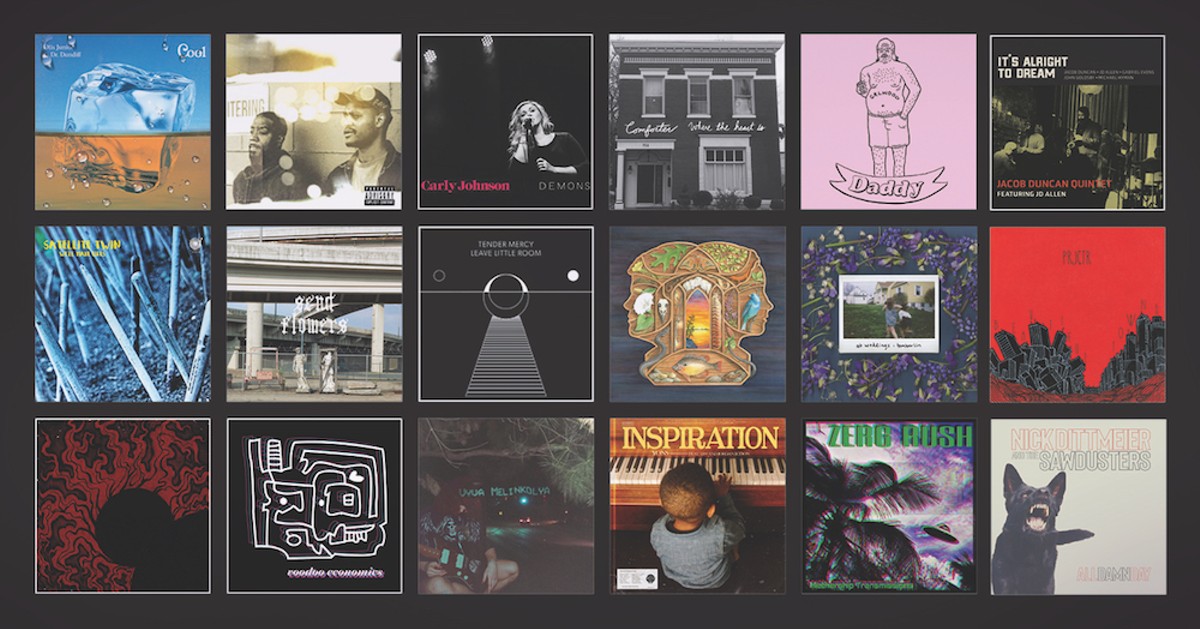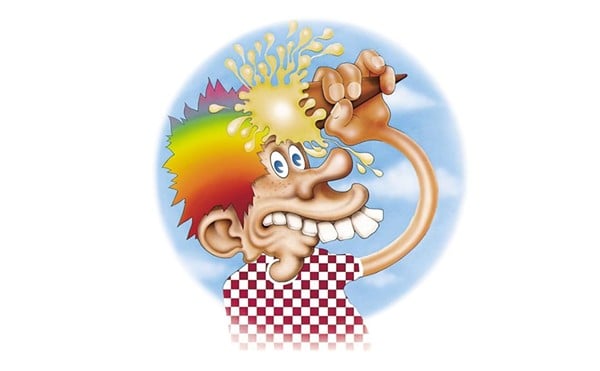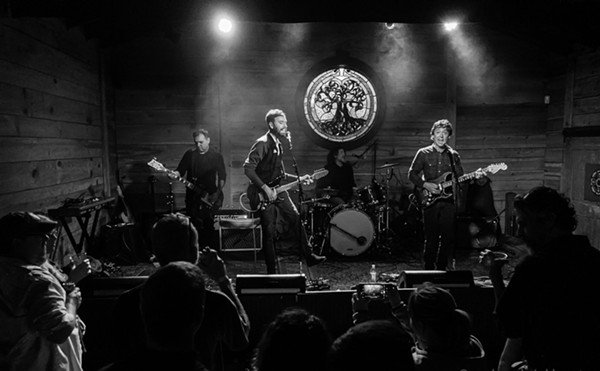It was once again a high-output, diverse year in Louisville music. And the annual LEO Playlist — our 20 favorite local songs of the year — reflects that through its range: oddball alt-country to silky smooth R&B to experimental jazz and to sharp hip-hop. Yet, 2018 was an emotionally-charged year for quite a few reasons, and that seems to be the connective tissue for many of the artists on our list, with profoundly sad songs, angry ones and those that leaned into nostalgia. The 20 songs are listed below in a way that mixes up the genres and LEO writers.
GRLwood — ‘I’m Yer Dad’
A year ago, fem punk duo GRLWood released their 2 Fags Demo, a raging, nine-track record including the indelible song “I’m Yer Dad.” This year, they released their first studio album, Daddy, which includes seven of the those same songs — “I’m Yer Dad” being one of them. First and foremost, this song is about American machismo, and making it in relation to your father is a heartbreaking reality for many who are daughters. Rej Forester literally screams “I’m Yer Dad” through most of this song, stressing in her vocals the embarrassment that they’re related. Karen Ledford’s drumming builds momentum throughout the song, begging you to stay for the punch line: “And I got a really big dick.” The word “really” was added to the studio album and notably the only crystal clear and spoken words you hear on this song. You can decipher a popcorn of words such as sports, man cave, porn, fuck me fast, fast car and NASCAR. The studio record has been professionally cleaned, so no more snare vibrations or a fuzzy mic. Rej’s guitar plucking sounds a bit more rockabilly, but Karen’s bass drum strikes are the energetic exclamation points.
—Julie Gross
State Champion — ‘Death Preferences’
By stacking stories on stories, State Champion frontman Ryan Davis builds these large, poetic, ambiguous and quickly-moving worlds that are structured like a cooler, punchier version of Thomas Pynchon’s work, but function like a gripping, yet vague dream that you’re left trying to make sense of, because it feels important. “Death Preferences” is one of the best examples of this, as it creates a puzzle packed with hidden and open-ended meanings. The profoundly sad vocals and production recall divorce-era Dylan, forming an emotionally-charged bond with the searching lyrics. If you sat down 10 people and made them listen to “Death Preferences,” you would get 10 different interpretations of the song, but it definitely makes you feel a certain way — intensely contemplative, a bit melancholy, with the big questions of the past, present and future circling around in your head. —Scott Recker
Yons — ‘Inspiration’ (ft. 1200 & Jordan Jetson)
“Inspiration” lives up to its name. The premise of the song is ultimately community and finding the strength in yourself to lift up the people around you. Backed by superlative verses from 1200 and Jordan Jetson, this song is about growth, and turning inward to look outward. “Inspiration” advises the listener to attempt to transform the negatives in the world through thinking and acting positively. The song is as uplifting as you would expect, and it’s equally as catchy. Produced by Yons, the beat blends elements of gospel and soul into hip-hop, which lends a spiritual charm. Each emcee is confident in their delivery, adding to the self-empowerment, which makes for a tight song with a fantastic message.—Syd Bishop
Tomberlin — ‘Any Other Way’
Sarah Beth Tomberlin reaches that special place in music where the confessional lyrics cause the listener to have similar reflections on their own past, creating an emotional thread between writer and consumer. There is a universal quality to her music filtered through a clear vision, causing the well-known to become freshly explored. “Any Other Way” features an acoustic guitar strummed with indifferent exhaustion, as Tomberlin’s strong and straightforward voice causes the song to rise away from the melody. I like to think of the lyrics being super glued to the melody and, as the song develops, Tomberlin patiently pulls the emotions and voice of the song away from this feeling of being stuck in repetition. With each listen, there is a new perspective or feeling to be explored. Tomberlin’s best strength is as a lyricist, with lines like, “You said that I was brave / But, I just feel insane / You said to look into your face each day / Can you tell I never look away?” —Zach Hart
The Other Years — ‘Adaline’
Concerts and festivals are often loud and unruly places, a natural byproduct of getting a bunch of people together and feeding them booze, but at Michigan’s annual Ann Arbor Folk Festival, the crowd is almost always dead silent, in some sort of trance, hanging on to every note. That’s the way I feel when I listen to The Other Years, the duo consisting of multi-instrumentalists Heather Summers and Anna Krippenstapel, who released their debut album in 2018. In “Adaline,” there’s something about the unhurried musicianship and unique, striking harmonies that pulls you in and commands your full attention. It’s old-timey music that doesn’t feel like it’s from a bygone era. It’s progressive folk that never feels pretentious. It’s familiar, and also refreshing. There’s a charm about “Adaline” that feels sincere and like a bit of a curveball. And that’s something that’s not always easy to find in contemporary folk. —Scott Recker
Jacob Duncan Quintet — ‘Oomamaboomba Boulevard’
A hard beat, a funky riff and solos that kill. This is the triad of forces that makes “Oomamaboomba Boulevard” the standout piece from the Jacob Duncan Quintet’s October release, It’s Alright to Dream. Grounded on a catchy melody, the tune could be played by a variety of instruments, as long as two leads are going full blast — in this lineup it’s Duncan (alto saxophone) and JD Allen (tenor). Both are guided by the heavy-handedness of drummer Michael Hyman, ripping into the main melody, while pianist Gabriel Evans grooves for the rhythm beside bassist John Goldsby. There’s an infectious energy carried throughout the entire song, and you will find that same vitality all over It’s Alright to Dream, a local jazz record that for any adventurous listener is worth checking out. —Lara Kinne
Tender Mercy — ‘The Year I Burst Into Tears’
Minimalist Mark Kramer (aka Tender Mercy) primarily uses his voice and electric guitar to strip down music to its bare essence. Each song is like a haiku of self-realization and private suffering. This song only has 24 words, which he repeats in verses like a somber lullaby. He strums individual notes with metronome timing to his partly-sung, partly-spoken, high-pitched vocals, but the way he lyrically pauses — almost swallowing syllables — adds a compelling ingredient to his fundamental tone. He poses the circumstance that if you “had a look inside, you saw everything you tried to hide.” It may take an entire year of weeping just to make sense of it all. In very few words and notes, he expresses what vulnerability truly sounds like.—Julie Gross
Touch A.C. X Filthy Rich — ‘The Darkest Gem’
There is a writhing gloom to “The Darkest Gem,” the third track on the Touch A.C. and Filthy Rich collab Doomsday Sun. The entire album features gritty production, a synth-and-drum-heavy sound that nods more than a little to Trent Reznor. “The Darkest Gem” is a tight philosophical study that balances deeply-profound spiritual conceits, with the general mundanity of life. In doing so, Touch asks listeners to consider the profundities of existence. Placed into context against the narrative’s fictional element, the coming of a celestial entity determined to devour our planet, the immeasurable Gritface, Touch and Filthy challenge you to live in the moment, in spite of the darkness. —Syd Bishop
Vyva Melinkolya — ‘Exist’
The lyrics to Vyva Melinkolya’s “Exist” — which are almost completely hidden in lush storms of shoegaze — are about feeling numb to the world, and concealing that from the people closest to you. Kicking off with the line “I’ve got no sense of home / And all my pleasure unknown / They ask me if I’m OK / And it’s so easy to fake,” the song paints an honest picture of the darkest thoughts and feelings that we pack away and hope no one finds. The atmospheric guitar work and production creates massive walls of noise and the shimmering vocal melody adds a dream-pop element. The song builds, falls, crashes and twists, creating a sonic soundscape that is enormous and impressive. But, underneath all of that, there’s the sort of vulnerability that takes true grit. —Scott Recker
Joan Shelley — ‘How Sad How Lovely’
The obscure, but beloved, American songwriter Connie Converse disappeared without a trace in the early 1970s, leaving behind only a series of carefully-crafted goodbye letters and a haunting body of work. Among Converse’s long-forgotten pieces was a ballad entitled “How Sad, How Lovely,” a song that was recently resurrected and reinterpreted by Louisville-based folk singer Joan Shelley for her 2018 covers EP Rivers & Vessels. While it is hard to outdo the inherent sadness of the original version, the sparse recording of Shelley’s new arrangement has a melancholic mystique of its own. On this plaintive take, there is but one lonesome guitar part to augment the gorgeous two-part harmony vocals of Shelley and fellow Kentucky troubadour, Daniel Martin Moore. After a few listens, you’ll know just how it feels to “see that sunset at the end of the street,” and those “shadows rising from the brim of the night.”
—Kevin M. Wilson
Barrel & Biscuit — ‘All I Got’
At just shy of four minutes “All I Got” is the longest track on the Tooth & Nail EP by the newly-formed Barrel & Biscuit, a duo of Rmllw2llz and Kendall Elijah Dynamite. “All I Got,” the most hooky of the four extremely catchy tracks, is a departure from Dynamite’s experimental pop and Rmllw2llz’s smooth electronic hip-hop style. The fuzzed-out bass and crackled drums make for a soulful track that would be at home between Saul Williams and Cedric Burnside on a warm summer night playlist, with its contemporary Delta juke beat and sing-along style vocals that proclaim: “Spending all I got just to get back to you.” It’s a near perfect neo-classic pop love gem. —John King
Satellite Twin — ‘We’ll Make Fires’
The modern era of instant gratification has replaced the tradition of punk rock split 7-inch singles, but, from time to time, one emerges that reminds us of the joy of physical media. The Mutts/Satellite Twin split 7-inch on Gubbey Records has Chicago’s Mutts on one side and Louisville’s Satellite Twin on the other. “We’ll Make Fires” is an appropriate pairing to Mutts’ post-Swordfishtrombones Tom Waits feel. It sounds like Foxy Shazam’s eccentric Eric Nally backed by Shellac. In this instant download era, the 7-inch record is possibly unnecessary, but the Mutts/Satellite Twin split 7-inch is completely worth the sticker price for any audiophile versed in the ‘90s Louisville/Chicago noise-rock pipeline. —John King
PRJCTR — ‘Syntax Error’
When a song starts off with the lyrics “everything was going my way,” it’s fair to anticipate it might end on the same upbeat note. Not here. Rumbles of distant drums and low guitars set a forbidding vibe that finds the protagonist. The guitars that simmered become more ferocious as the drums move to a war pitch. “You are alone” is growled and then roared. Nothing is OK. Nothing is all right, even as the song fades away. This is one of the best songs of 2018 because PRJCTR’s piercing message of abject hopelessness. It’s a deeply dark song, but it’s up to us to find the cracks that let the light in. —Nik Vechery
Zerg Rush — ‘High Stepper’
With their debut collection of demos, Zerg Rush transcends the sort of likable, yet sloppy, working-out-the-kinks record that you might expect from a young punk band. Instead, they made something sharp and versatile, packed with raw power and range. On “High Stepper” — a song that sounds like if the New York Dolls experimented with surf rock — singer Zonny Mondo’s voice is as wild and free as the song’s protagonist, building and falling all over the place, from hushed mumbles to soaring verses to explosive screams. The song doesn’t attempt to be perfect, but the small blemishes are weaponized as its greatest strengths. It feels like bottled lightning. —Scott Recker
Comforter — ‘827 Melford’
With “827 Melford,” Comforter has managed to distill the best elements of the very en vogue early/mid-‘90s rock sound. There’s a sad bastard/feel-good juxtaposition, with an unavoidable melancholic thread, sewn through the song’s straightforward framework, but the kind that never fails to invoke bittersweet memories. Perhaps it’s the warm, anchored march of the bass and drums or the dreamy guitar work or the singer lamenting halfway through that “nothing lasts forever.” Whatever the case, “827 Melford” is a powerfully nostalgic song that will send you searching through the past. —Tyrel Kessinger
Voodoo Economics — ‘Topper’
There was this great period of music in the mid-to-late ‘90s when rock bands decided that great music could come from having fun with small topics. Everyday moments were distilled into anthems by examining the so-called unimportant subjects of life. Think The Presidents Of The United States Of America hit “Peaches” — a song about picking peaches and love. Simple, fun and very catchy. It’s refreshing to feel that way again with the Voodoo Economics track “Topper,” on which singer and guitarist Shane O’Brian takes the listener into the fully-realized perspective of a guy delivering pizzas all over Louisville. It feels episodic, each verse creating its own little sitcom scene. A bouncy, slow guitar gives way to a bombastic chorus. When the chorus hits, all the guitar parts come forward, mix together and then take a backseat to the story for another clever verse. The results are infectious, especially if you’re a fan of that irreverent indie rock of the mid-’90s.—Zach Hart
Nick Dittmeier & the Sawdusters — ‘Two Faded Carnations’
The brilliance of “Two Faded Carnations” is not only in what it tells you, but also in what it leaves out. Each of the three verses in the evocative alt-country story song reveal a twist — the protagonist visiting a cemetery, a past robbery gone wrong, estranged family members — but it’s light on the exact details, which leaves you with more questions than answers and searching for clues in repeat listens. The song’s magic is that it gives you just enough to build a vivid scene in your head, but it leaves room to speculate. It draws the lines, but it lets you to color them in. The story could stretch into a novel, but the brevity in “Two Faded Carnations” dictates its impact. It’s not overly concerned with creating a complete character, or having a tidy ending. There’s a lot of murky gray area. And that’s what makes it special. —Scott Recker
Carly Johnson & The Believers — ‘Hit the Ground Running’
Carly Johnson’s strong voice is fluid enough to adapt to practically any musical style, but it’s soul and pop that occupies Demons, an EP with her band The Believers, which was released in May as a preview for the forthcoming album Pink & Gold (2019). She doesn’t brood for long over past pain in “Hit the Ground Running,” instead she ignites the listener with an urgency to sing along and move through the hardships. From when the opening keys lead into her drawn-out vocals on the line “A woman’s only good as her word” to the ass-kicking chorus that advises that you “better get out now,” this song swells with confidence. —Lara Kinne
Jaye Jayle — ‘Ode To Betsy’
The evolution of Evan Patterson from the visceral highs of Breather Resist and the earliest material from Young Widows to the Southern gothic tension of Jaye Jayle is rarely so clear as it is on “Ode to Betsy.” A literal ode to a lost companion, Patterson’s dog Betsy, the track carries the weight of the world on its shoulders, a dirge that serves as a slow build. Patterson channels his inner Leonard Cohen or Nick Cave, a confident baroque growl that weaves a compelling and multi-layered narrative tapestry. A grim meditation on loss, Patterson’s words are beautiful poetry delivered with style and panache atop a brutal melody. There is a reflective tension between the music and the lyrics, an aggression that might not translate without the distorted bass rumble and plodding beat. This is intense, about how in losing someone close, you also lose part of yourself. —Syd Bishop
Otis Junior & Dr. Dundiff — ‘Poems’ (ft. ZLynn Harris)
With their third album, the duo of Otis Junior and Dr. Dundiff continue to progress, mixing silky R&B vocals with mad scientist production techniques. The duo’s greatest strength is the ability to take the bones of a simple love song and turn it into something massive and completely unique, which is evident on “Poems.” Dundiff’s production is as intricate and compelling as ever, while Otis Junior and ZLynn Harris both turn in a masterful vocal performances. Junior and Dundiff excel at building complicated songs that are easy to listen to. The vocals on “Poems” are a warm call-and-response, while the beat paves a smooth, yet interesting path. They are boundary pushers, crafting something that sounds equally inspired by Motown and J Dilla. —Scott Recker






